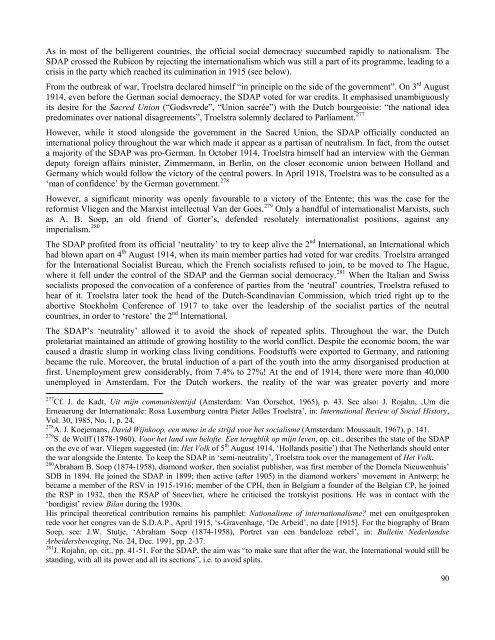The German-Dutch Communist Left - Libcom
The German-Dutch Communist Left - Libcom
The German-Dutch Communist Left - Libcom
You also want an ePaper? Increase the reach of your titles
YUMPU automatically turns print PDFs into web optimized ePapers that Google loves.
As in most of the belligerent countries, the official social democracy succumbed rapidly to nationalism. <strong>The</strong><br />
SDAP crossed the Rubicon by rejecting the internationalism which was still a part of its programme, leading to a<br />
crisis in the party which reached its culmination in 1915 (see below).<br />
From the outbreak of war, Troelstra declared himself “in principle on the side of the government”. On 3 rd August<br />
1914, even before the <strong>German</strong> social democracy, the SDAP voted for war credits. It emphasised unambiguously<br />
its desire for the Sacred Union (“Godsvrede”, “Union sacrée”) with the <strong>Dutch</strong> bourgeoisie: “the national idea<br />
predominates over national disagreements”, Troelstra solemnly declared to Parliament. 277<br />
However, while it stood alongside the government in the Sacred Union, the SDAP officially conducted an<br />
international policy throughout the war which made it appear as a partisan of neutralism. In fact, from the outset<br />
a majority of the SDAP was pro-<strong>German</strong>. In October 1914, Troelstra himself had an interview with the <strong>German</strong><br />
deputy foreign affairs minister, Zimmermann, in Berlin, on the closer economic union between Holland and<br />
<strong>German</strong>y which would follow the victory of the central powers. In April 1918, Troelstra was to be consulted as a<br />
‘man of confidence’ by the <strong>German</strong> government. 278<br />
However, a significant minority was openly favourable to a victory of the Entente; this was the case for the<br />
reformist Vliegen and the Marxist intellectual Van der Goes. 279 Only a handful of internationalist Marxists, such<br />
as A. B. Soep, an old friend of Gorter’s, defended resolutely internationalist positions, against any<br />
imperialism. 280<br />
<strong>The</strong> SDAP profited from its official ‘neutrality’ to try to keep alive the 2 nd International, an International which<br />
had blown apart on 4 th August 1914, when its main member parties had voted for war credits. Troelstra arranged<br />
for the International Socialist Bureau, which the French socialists refused to join, to be moved to <strong>The</strong> Hague,<br />
where it fell under the control of the SDAP and the <strong>German</strong> social democracy. 281 When the Italian and Swiss<br />
socialists proposed the convocation of a conference of parties from the ‘neutral’ countries, Troelstra refused to<br />
hear of it. Troelstra later took the head of the <strong>Dutch</strong>-Scandinavian Commission, which tried right up to the<br />
abortive Stockholm Conference of 1917 to take over the leadership of the socialist parties of the neutral<br />
countries, in order to ‘restore’ the 2 nd International.<br />
<strong>The</strong> SDAP’s ‘neutrality’ allowed it to avoid the shock of repeated splits. Throughout the war, the <strong>Dutch</strong><br />
proletariat maintained an attitude of growing hostility to the world conflict. Despite the economic boom, the war<br />
caused a drastic slump in working class living conditions. Foodstuffs were exported to <strong>German</strong>y, and rationing<br />
became the rule. Moreover, the brutal induction of a part of the youth into the army disorganised production at<br />
first. Unemployment grew considerably, from 7.4% to 27%! At the end of 1914, there were more than 40,000<br />
unemployed in Amsterdam. For the <strong>Dutch</strong> workers, the reality of the war was greater poverty and more<br />
277 Cf. J. de Kadt, Uit mijn communistentijd (Amsterdam: Van Oorschot, 1965), p. 43. See also: J. Rojahn, ‚Um die<br />
Erneuerung der Internationale: Rosa Luxemburg contra Pieter Jelles Troelstra’, in: International Review of Social History,<br />
Vol. 30, 1985, No. 1, p. 24.<br />
278 A. J. Koejemans, David Wijnkoop, een mens in de strijd voor het socialisme (Amsterdam: Moussault, 1967), p. 141.<br />
279 S. de Wolff (1878-1960), Voor het land van belofte. Een terugblik op mijn leven, op. cit., describes the state of the SDAP<br />
on the eve of war. Vliegen suggested (in: Het Volk of 5 th August 1914, ‘Hollands positie’) that <strong>The</strong> Netherlands should enter<br />
the war alongside the Entente. To keep the SDAP in ‘semi-neutrality’, Troelstra took over the management of Het Volk.<br />
280 Abraham B. Soep (1874-1958), diamond worker, then socialist publisher, was first member of the Domela Nieuwenhuis’<br />
SDB in 1894. He joined the SDAP in 1899; then active (after 1905) in the diamond workers’ movement in Antwerp; he<br />
became a member of the RSV in 1915-1916; member of the CPH, then in Belgium a founder of the Belgian CP, he joined<br />
the RSP in 1932, then the RSAP of Sneevliet, where he criticised the trotskyist positions. He was in contact with the<br />
‘bordigist’ review Bilan during the 1930s.<br />
His principal theoretical contribution remains his pamphlet: Nationalisme of internationalisme? met een onuitgesproken<br />
rede voor het congres van de S.D.A.P., April 1915, ‘s-Gravenhage, ‘De Arbeid’, no date [1915]. For the biography of Bram<br />
Soep, see: J.W. Stutje, ‘Abraham Soep (1874-1958), Portret van een bandeloze rebel’, in: Bulletin Nederlandse<br />
Arbeidersbeweging, No. 24, Dec. 1991, pp. 2-37.<br />
281 J. Rojahn, op. cit., pp. 41-51. For the SDAP, the aim was “to make sure that after the war, the International would still be<br />
standing, with all its power and all its sections”, i.e. to avoid splits.<br />
90
















